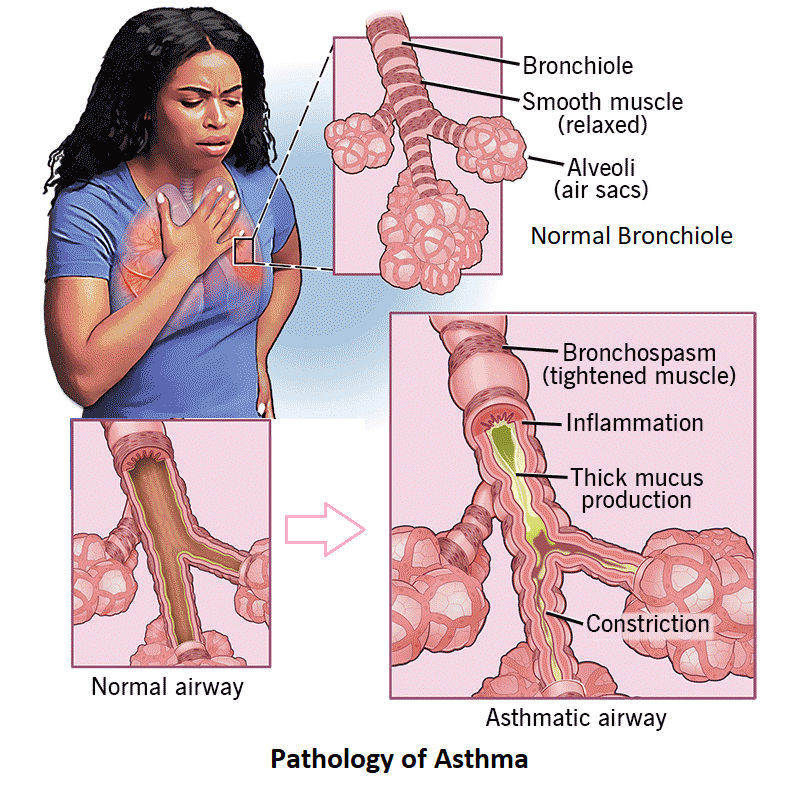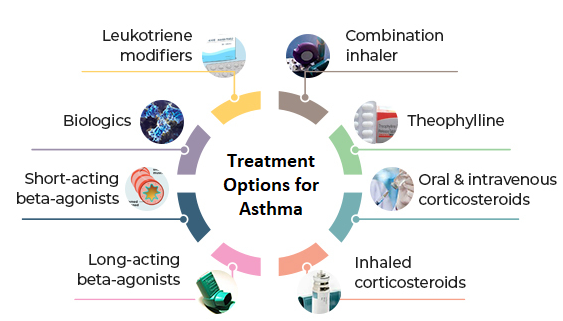
 Bronchial asthma is a chronic lung disease of the airways characterized by bronchial hyperreactivity and a variable degree of airway obstruction. It is diagnosed based on clinical history, physical examination, and pulmonary function tests, including reversibility testing and measurement of bronchial reactivity. The goal of treatment is to control the symptoms of the disease effectively and in a lasting fashion. Long-term treatment with different types of inhalers for asthma is the basis of asthma treatment, alongside preventive measures and patient education. Bronchodilators such as beta2 sympathomimetics are used for rapid symptomatic relief of acute attacks of breathing difficulty.
Bronchial asthma is a chronic lung disease of the airways characterized by bronchial hyperreactivity and a variable degree of airway obstruction. It is diagnosed based on clinical history, physical examination, and pulmonary function tests, including reversibility testing and measurement of bronchial reactivity. The goal of treatment is to control the symptoms of the disease effectively and in a lasting fashion. Long-term treatment with different types of inhalers for asthma is the basis of asthma treatment, alongside preventive measures and patient education. Bronchodilators such as beta2 sympathomimetics are used for rapid symptomatic relief of acute attacks of breathing difficulty.
Breathing difficulty treatment and therapies are an essential part of management. Inhalers are commonly used to treat asthma symptoms, with reliever inhalers used to provide quick relief during an asthma attack, and preventer inhalers used to reduce inflammation and prevent symptoms from occurring. Combination inhalers may also be used as the best medicine for asthma and allergies.
Inhalers are a helpful tool for managing asthma symptoms. Asthma inhalers, which are devices that let you breathe in medicine, are the main treatment. A tablet for asthma and another different inhaler for cough may also be needed if your asthma is severe.
In addition to inhalers, tablets may also be prescribed to control asthma symptoms. Leukotriene receptor antagonists (LTRAs) are a common tablet option and are taken daily to prevent symptoms from occurring. Other tablet options include theophylline and steroid tablets, which are typically used as a last resort for severe asthma cases.For those with severe asthma, injections of biological therapies may be recommended. Bronchial thermoplasty, a procedure that uses heat to stop airway narrowing, may also be used for some people with severe asthma.
If you believe your asthma is related to your job, it is important to speak with a specialist to confirm the diagnosis. Your employer has a responsibility to protect you from the causes of occupational asthma, which may involve substituting or removing triggers from the workplace, redeploying you to another role within the company, or providing protective breathing equipment. The best cough medicine for asthmatics constitutes a rational combination of all available.
 Asthma attack treatment: Every child with asthma needs quick-relief medicine to treat coughing, wheezing, shortness of breath of an asthma attack. Your child should have the best inhaler for asthma at all times and he/she should use it at the first sign of symptoms.
Asthma attack treatment: Every child with asthma needs quick-relief medicine to treat coughing, wheezing, shortness of breath of an asthma attack. Your child should have the best inhaler for asthma at all times and he/she should use it at the first sign of symptoms.
Preventative (c ontrollers): Children may need a controller if they are using quick-relief medication too often or frequently need oral corticosteroids such as prednisone for asthma attacks. Many children with asthma also need to take a controller daily to prevent asthma symptoms.
1 Mental strategies: Asthma can have not only physical and environmental triggers but also psychological ones, such as stress, anxiety, or depression. Trying different ways of mental grounding or psychological treatment may help reduce asthma flare-ups in some cases.
2. Hypnotherapy: In hypnotherapy, hypnosis makes a person more relaxed and open to new ways to think, feel, and behave. Hypnotherapy may also help facilitate muscle relaxation, which may help people with asthma cope with symptoms like chest tightness.
3. Mindfulness and meditation: Mindfulness is a type of meditation that focuses on how the mind and the body are feeling in the present moment. It can be practiced almost anywhere.
4. Breathing exercises: Several different breathing exercises may help relieve symptoms of asthma.
5. Papworth method: The Papworth method is a breathing and relaxation technique used since the 1960s to help people with asthma. It involves using your nose and diaphragm to develop breathing patterns. You can then apply these breathing patterns to various activities that may cause your asthma to flare up.
6. Yoga: Yoga incorporates stretching and breathing exercises to help boost flexibility and increase overall fitness. For many people, practicing yoga can decrease stress, which may trigger asthma.
7. Speleo-therapy: It is a type of dry salt therapy. It involves spending time in a salt room, introducing tiny particles into the respiratory system.
8. Nutrition: Although there’s no specific diet for people with asthma, there are a few nutrients and foods that may help relieve your symptoms.
9. Beta-carotene, vitamin C, vitamin E: Being overweight or having obesity increases your risk. It’s important to maintain a balanced diet including plenty of fruits and vegetables. These foods are good sources of antioxidants like beta-carotene, vitamin C, and vitamin E, which may help reduce symptoms.
10. The gut microbiome: Asthma symptoms may worsen if there’s an imbalance of beneficial bacteria in your gut. Consuming probiotics may help reduce inflammation. In addition, some cheeses contain probiotics, and you can also take probiotic supplements, though getting them from your diet may be preferable.
11. Garlic and Ginger: Garlic and Ginger have several health benefits, including anti-inflammatory properties, according to research. Because asthma is an inflammatory disease, garlic may be able to help relieve your symptoms.
12. Honey: Honey is frequently used in cold remedies to help soothe the throat and reduce coughing.
13. Omega-3 oils: Omega-3 oils, which can be found in fish and flax seeds, have been shown to have many health benefits. They are also associated with decreased airway inflammation, which may help improve lung function in people with severe asthma.
14. Caffeine: Caffeine is a bronchodilator, which means it can help open up the pathways into the lungs. Also, it can help reduce respiratory muscle fatigue.
According to the literature, acupuncture can enhance the immune system function of patients and thus play a role in relieving phlegm. According to several clinical practices, acupuncture therapy has a considerable effect, has a high technical content, can inhibit allergic reactions, activate its defence system function, and the patient's bronchial smooth muscle tone is reduced, and finally achieve the anti-asthmatic purpose.
Another study says “Clinical studies in recent years have found that the use of acupuncture in the treatment of bronchial asthma has a good clinical application prospect. This study was conducted to study the effect of using acupuncture to treat asthma.”
We are at Dr. Pardeshi Acupuncture and have been treating asthma regularly and are satisfied without coming.